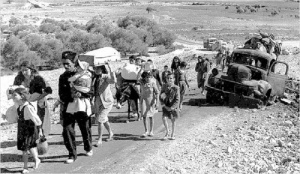
As an occasional Critic, I find it rather difficult to compose such a stellar review on a topic that is quite unforeign to many of us now referring to Michael H. Brownstein’s latest chapbook Firestorm: A Rendering of Torah which is a collection of poems regarding the insurgence of the 1948 war against the Palestinians; poems beautifully penned, vividly detailed, and indisputably compelling. But in order to give such a review without adding insult to injury particularly on a subject I [honestly] knew nothing of only up until recently when this chapbook was presented to me, I instead decided to go to the source himself and transcend this review rather into an interview by inquiring several questions as to give the audience a more personal insight to Firestorm: A Rendering of Torah and why the author chose to write about it.
1.) Michael, what inspired you to write Firestorm: A Rendering of Torah?
All of my life I have been taught Israel was right and everyone else—the Arabs, the Palestinians—were wrong. It was cut and dry. Though I’m not a Zionist (and never was)—and I am Jewish—I never really believed Israel was above the law and everything that went into making this tiny Jewish state was positive. I did hold the belief that Israel came about because it was fighting for its very life. Then I read Against Forgetting: Twentieth-Century Poetry of Witness (W.W. Norton, 1993), by Carolyn Forché, The section on the 1948 war amazed me. I did not know or even understand that any of this could have possibly happened. Yes, perhaps against the British—but innocent Palestinians? No.
So I began researching. Could Forché be making this up? I knew due to her reputation that she wasn’t. The more I got into it, the more disconcerted—if that can be the word—I became. We had just come from a major Holocaust and now we were doing the same kinds of things we said “Never Again” to the Palestinians. The further I got, the more energized, the more passionate, the more angry at all of the lies I had been fed (and believed)—and finally I knew I had to let others know. So I took my passion for poetry, my research on the 1948 war that began after reading Forché’s book, and combined them to make this book. I who had lived behind a shadow all of these years decided no one else should have to. Truth has power. Poetry, too, has power. The making of Firestorm became a passion I could not put out.
2.) Did you possess personal knowledge and/or experience which inspired you to write Firestorm: A Rendering of Torah?
Simple answer: No. I just could not believe Israel could develop out of such falsehoods, the rewriting of history and, well, downright lies. Did you know on many maps—particularly maps in the Middle East—Israel is called Occupied Palestine?
3.) Or did you know any of the MC’s in your poetry and prose to inspire such a write?
Once again, no, I just learned all about this about a year ago when I read the section in Forché’s book. Before then, no, I thought all atrocities were against the British by the Jews or the Palestinians against the Jews. I never thought the Jews could be capable of harming others the way they had just been harmed—World War II was only three years in the past. I could not believe leaders of the new Israel considered themselves the first and best terrorists. I could not believe men got away with atrocities and became leaders of this new nation while they were prosecuting Germans for crimes against humanity. I could not believe how hypocritical Israel was. The more I researched, the more I knew this story had to be told.
4.) What was your purpose in writing Firestorm: A Rendering of Torah?
To begin a discussion on the issues of what the 1948 war caused. To correct the rewriting of history. To show the other side of the story in much of its gruesome detail. To begin a real dialog between two people who are both Semitic, but cannot sit down and talk peace. To make Israel acknowledge their wrongs and make them make them right. To change the view of Zionism. To help the Palestinians regain what they lost.
5.) Do you think much has changed since then?
Unfortunately, I feel we are moving backwards. The Palestinians are maintained in the world’s oldest refugee camps and they are still treated badly. It’s time for a change and I actually have hopes that people reading Firestorm will want to engage and dialog in making these changes come to be.
For those of you who have yet to read Firestorm: A Rendering of Torah and wish to read it in its entirety, you can find the chapbook here: http://www.booksonblog35.blogspot.com.
Enclosing, Michael would very much like to thank his editor and publisher, Russell Streur of the Camel Saloon who supported the project and felt very strongly that Firestorm: A Rendering of Torah should be published. Michael also goes on to add that he is very glad Russell had the guts and the determination to work with him on this important (in which he feels) project.
I would also like to take this opportunity to thank the author himself for allowing me to inquire these valid questions and for the manner in which he answered them in. And I too strongly feel that if I had not taken the route I have taken with Firestorm: A Rendering of Torah this review/interview would have never came about. Thank you, Michael.
Devlin De La Chapa-
Editor, BoySlut
